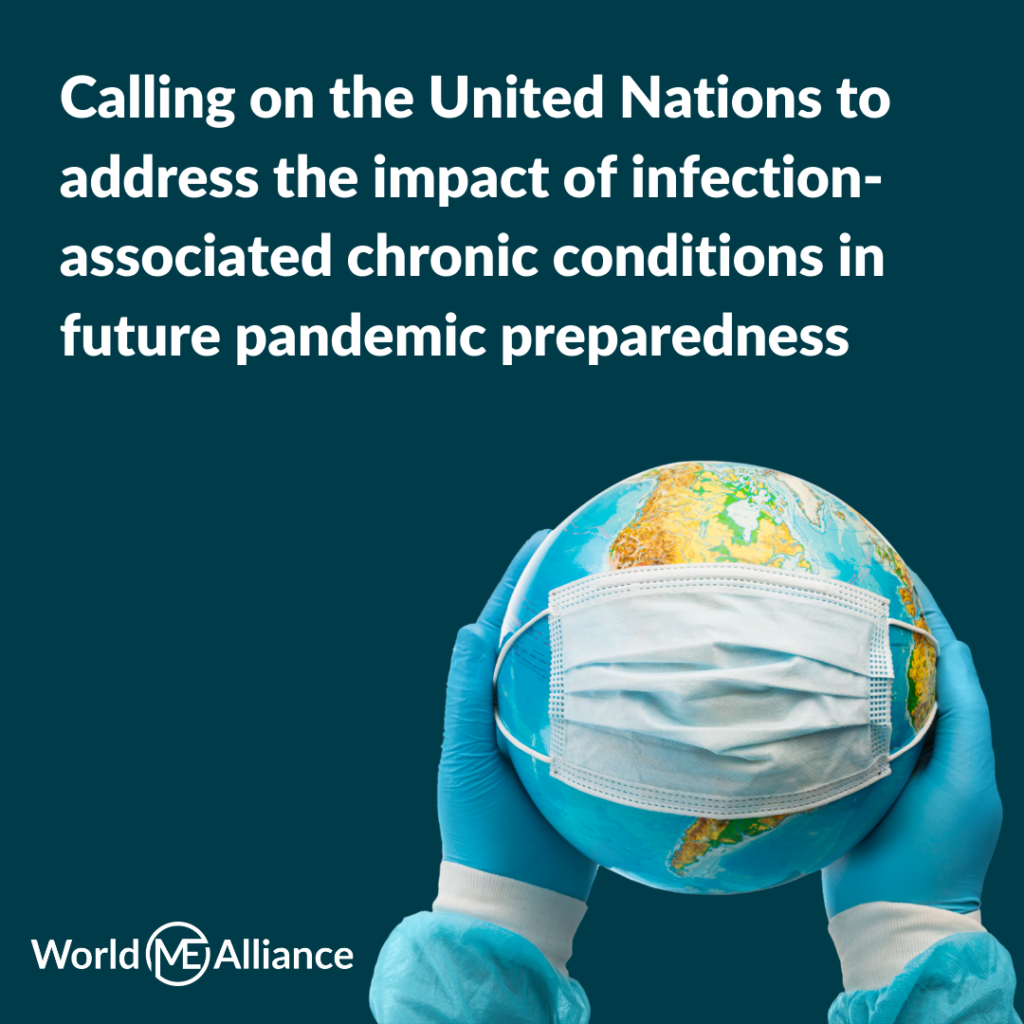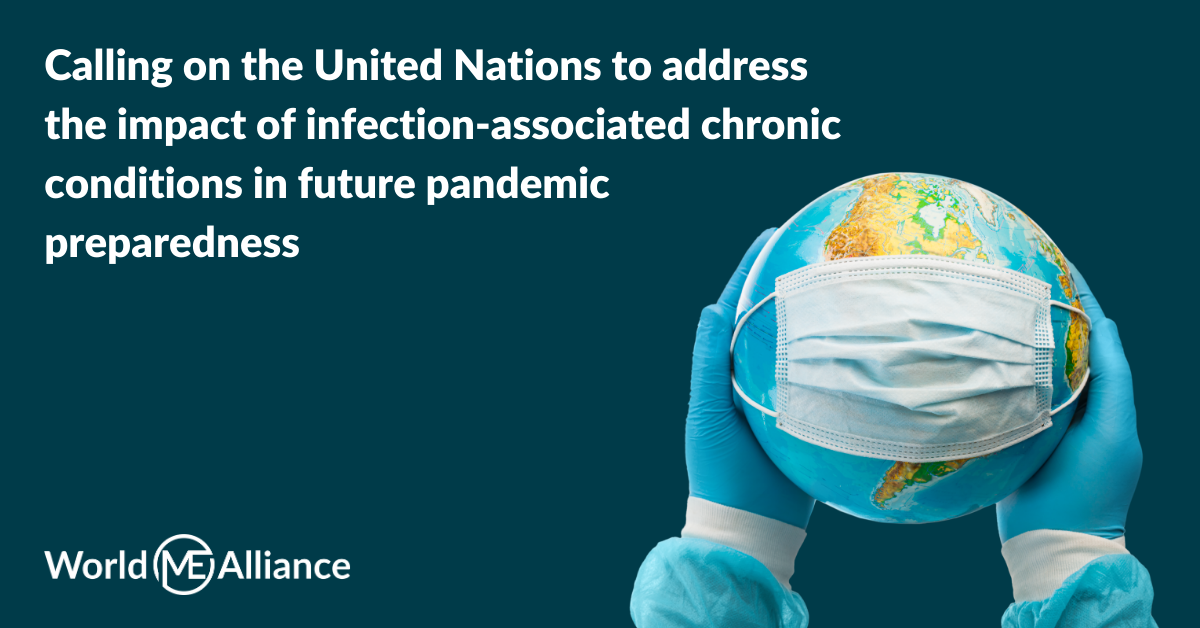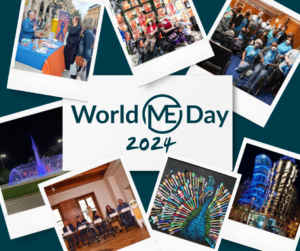Future pandemic preparedness will fail millions without explicit recognition of and research into infection associate chronic conditions.
On 20th September 2023, the United Nations General Assembly adopted a Political Declaration on Pandemic Prevention, Preparedness and Response.
The commitments outlined in this declaration are vital for enhancing global readiness to tackle future pandemics effectively, yet they fail to address infection-associated chronic conditions. Globally, more than 65 million people are now living with long COVID, of whom 50% meet the criteria for a diagnosis of ME/CFS and over 70% have developed dysautonomia. The need for recognition and expedited research to address these chronic illnesses is undeniable.
Facilitated by the World ME Alliance, 32 organizations have joined in calling on His Excellency Mr Dennis Francis, President of the 78th UN General Assembly, to raise awareness of this critical issue within the UN and among member states, and meet with us to discuss working toward a healthier and more resilient world for all.
Addressing the impact of infection-associated chronic conditions in future pandemic preparedness
World ME Alliance
42 Temple Street
Keynsham
UK
BS31 1EH
17th October 2023
His Excellency Mr Dennis Francis
633 Third Avenue
12th Floor
New York
USA
N.Y., 10017
Addressing the impact of infection-associated chronic conditions in future pandemic preparedness
Your Excellency Mr Dennis Francis,
We write to you as a coalition of myalgic encephalomyelitis (ME), long COVID, dysautonomia and infection-associated chronic condition organizations.
Firstly, we commend the adoption of the recent Political Declaration of the United Nations General Assembly High-level Meeting on Pandemic Prevention, Preparedness and Response (20th September 2023). The commitments outlined in this declaration are vital for enhancing global readiness to tackle future pandemics effectively. However, we wish to bring to your attention a critical aspect that was regrettably not addressed within this important declaration.
The COVID-19 pandemic has brought greater attention to the significant and often overlooked issue of chronic illness triggered by infectious diseases. Long COVID, also known as Post-COVID-19 condition, has emerged as a widespread concern. An estimated one in ten SARS-COV-2 infections is leading to long COVID, affecting millions worldwide. These individuals experience a constellation of persistent symptoms, including post-exertional malaise, extreme fatigue, shortness of breath, cognitive dysfunction, unrefreshing sleep, orthostatic intolerance and widespread pain. Research now suggests 50% of those with long COVID meet the criteria for an ME diagnosis, and over 70% have developed dysautonomia. These conditions have a profound impact on the lives of those affected, causing severe debility and often leading to social and economic consequences.
Moreover, historical records show that after previous pandemics and epidemics, from the Greek plague of 430 BC to the Spanish Flu of 1918 to the 2014 Ebola virus disease outbreak, there have been accounts of individuals who never fully recover, living with chronic illnesses that often mirror the symptoms of ME and dysautonomia. This pattern underscores the importance of recognizing infection-associated chronic illnesses as a recurring issue following pandemics, with long-lasting implications for affected individuals and society as a whole.
Therefore, we respectfully urge the United Nations and its member states to consider addressing this significant gap in pandemic preparedness and response. We call for future initiatives and strategies related to pandemic preparedness to explicitly include actions on the impact of infection-associated chronic illnesses, such as long COVID, ME, POTS and other forms of dysautonomia and more.
Vitally, these efforts should encompass research and recognition, with immediate recommendations to invest in research to understand the underlying mechanisms of these conditions, facilitate early diagnosis, and improve recognition, medical education and treatment.
We kindly request your support in raising awareness of this matter within the United Nations and among member states. We, the undersigned, are committed to providing aid and being a resource for the UN and member states in this endeavour. Together, we can work towards a more inclusive and responsive approach to pandemic preparedness that considers the long-term health and well-being of all individuals affected by infectious diseases.
Thank you for your attention to this critical issue. We look forward to the opportunity to discuss this matter further with yourself or an appropriate colleague and collaborate towards a healthier and more resilient world for all.
Yours sincerely,
Sonya Chowdhury, Co-chair of the World ME Alliance and CEO of Action for M.E., UK
Oved Amitay, Co-chair of the World ME Alliance and CEO of Solve M.E., US
Sian Leary, Head of Advocacy and Communications, World ME Alliance
And the 32 undersigned organizations:
World ME Alliance – Global
Long Covid Alliance – Global
Dysautonomia International – Global
#MEAction – Global
12ME – Belgium
ACAF – Spain
Action for M.E. – UK
AMMES – The American ME and CFS Society
ANZMES – The Associated New Zealand Myalgic Encephalomyelitis Society
Associazione Italiana Long COVID – Italy
AQEM – Association québécoise de l’encéphalomyélite myalgique – Canada
CFS/ME Associazione Italiana – Italy
CFS/ME Organizzazione di Volontariato – Italy
European ME Coalition
Emerge Australia
Forward ME – UK
Hope 4 ME and Fibro Northern Ireland
Japan ME Association
ME CVS Nederland
ME Support (IOM) – Isle of Man
ME/CFS Israel
Millions Missing Belgique
Millions Missing Canada
Millions Missing France
Millions Missing Mexico
Mirame Arts – Germany
MYOS – Portugal
Neúnavní – Czechia
Plataforma Familiars FM-SFC-SQM Síndromes de Sensibilització Central – Spain
Solve M.E. – US
The ME CFS Foundation South Africa
WAMES – Welsh Association of ME & CFS Support





